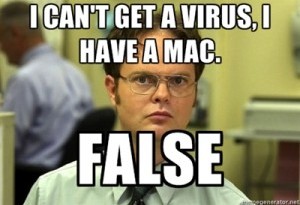
Do Macs get viruses?
Do Apple Macs want security software, or is the Mac OS safe to make use of without antivirus? Do Macs even get viruses? We learn more about the problems surrounding Macs and security software.
The inquiry of whether Macs want antivirus isn’t a fresh one, but the response is transforming. While Macs are usually more secure than Windows PCs, they’re far from protected. Head over to the newsgroups on the Apple’s web site and

you’ll locate exactly the same response time and again – ‘you do not want security software because I haven’t got security software and it is never been a issue’. The scientists among you may recognise this as a confusion of cause and effect. It is also a simplification of a complicated problem. 2017 has already found multiple reports that indicate Macs are less safe than they once were. Business Insider asserts that Macs are now more exposed to viruses and assault than even Windows PCs. And Fortune has warned of Mac malware that could freeze Apple computers.
Here then, are reasons for and against the idea that Macs do not need antivirus.
Why Macs want antivirus:
There aren’t any technical reasons why the Mac OS can’t be targeted by cybercriminals. Really, there are exploits in the wild: albeit they may be mostly Trojans, and require a user to erroneously install them.
Yes, offenders target the lowest hanging fruit, it’s more difficult to target Macs, as well as the quantities of Mac users are comparatively modest, but that circumstances could change.
Windows is getting more risk-free – Windows 8 and Windows 10 are the most secure Windows ever – as well as the Mac market share in rich western nations is around 20-30 percent.
If you think about that Macs are expensive, and so their owners are usually more affluent in relation to the typical PC users, they begin to look like an appealing goal.
I am not scaremongering – the danger isn’t there in any major scale. But someday it might be, and that may make AV a worthwile investment.
It is also worth remembering the end user is consistently the weakest link. In a variety of ways security software exists to save you from poor choices – installing programs that seem to offer something for nothing, but turn out to be spyware or viruses. Even Mac users can fall victim this way. So for the cost of a cup of coffee each week, it seems sensible to set up security software after which forget all about it.
Macworld UK possess the authoritative guide to the finest antivirus for Mac. It’s frequently upgraded, and is worth checking out as some of the finest Mac antivirus products are free. At the moment the number one recommended product is BitDefender Antivirus.
What follows is the counter argument regarding why Macs do not want antivirus, but we nevertheless believe it is better to be safe than sorry.
Why Macs do not want antivirus
Quite simply, because all the evidence indicates they do not. I have had an unguarded Mac on the internet for almost 15 years, and I’ve not ever had a difficulty. Why this is the case will be worht investigating, yet.
The argument frequently put forward is an easy one of marketplace economics: because Apple’s worldwide market share is in single figures, offenders go after the larger shoals of fish in the Windows world.
There’s some thing in this – basically all present malware exists to create cash for offenders. Criminals aren’t understood for their program or innovation, so the largest, easiest goal gets all the focus.
In practice, cybercriminal gangs are focused solely on Windows since there are more Windows users, yes, but also because Windows is still less difficult to hack.
As a Unix-based operating system the Mac OS is by its very nature sandboxed. It is like having a streak of fire doors – even if malware gets access to your Mac, it’s not able to propagate to the center of the machine.
Macs aren’t unhackable, nevertheless they’re harder to use than are Windows PCs. So just as a burglar could break into a home with an alarm system but will likely pick the unguarded home next door, a Mac makes a less appealing goal in a world in which only appealing goals are usually assaulted.
The latest variants of macOS – everything since OS X 10.8 Mountain Lion – take this even further. They contain the GateKeeper function that by default prevents Mac users from installing anything apart from Apple-approved applications.
The presence of the Mac app store means that Apple computer users can install applications with total reassurance.
And also the shortage of Java and Flash plugins removes the desire to set up imitation versions of both – formerly the main vectors of disease for Macs.
Do Macs need antivirus: the verdict
I’d say that if you’re employing your Mac at home, usually for non-company functions, you can shut this post and keep to work without security software. Yes, it’s a threat. But using the web is a threat, and in my considered view running a Mac without AV is a rewarding measured hazard.
There are exceptions, however. In case you are operating a company using a fleet of Macs, or a network of both Macs and Windows PCs, I’d suggest becoming in some protection. Itis a belt and braces approach that might not be needed, but when you have a good deal to lose itis a small cost to cover peace of mind.
You may even consider using antivirus in your Mac if for some reason you might be targeted separately – in case you have access to sensitive or high-value information, for example.